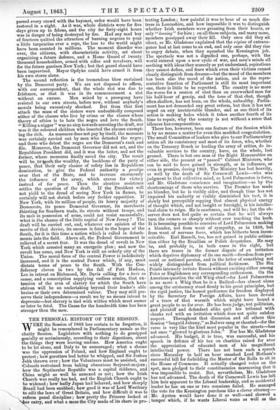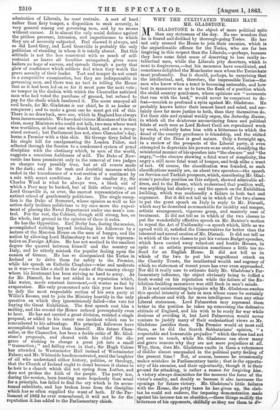THE PERSONAL HISTORY OF THE SESSION.
WERE the Session of 1863 less certain to be forgotten, it might be remembered in Parliamentary annals as the ohatty Session. Legislators with nothing to do gossipped -genially or acriminously, according to their digestions, about -the things they were leaving undone. How America ought to be let alone, and Italy to be encouraged; what a shame was the oppression of Poland, and how England ought to
⢠protest ; how garotters had better be whipped, and Sir Joshua debb thrown over ; how the Volunteers must be assisted, and Colonels restrained from baking obnoxious Serjeant-majors ;
⢠how the Septinsular Republic was a capital riddance' and China might as well be annexed as not; how the Irish Church was really too bad, and the English Church ought ta be widened ; how badly Japan had behaved, and how sharply Brazil had been snubbed; how good it was of Lord Westbury to edit the laws of Great Britain, and how difficult it was to
- reform penal discipline ; how pretty the Princess looked at
- er entry, and what a mess the City made of its share in pro- tecting London ; how painful it was to hear of so much dis- tress in Lancashire, and how impossible it was to distinguish whether Irish members were groaning from their hearts, or only "keening" for hire ; on all these subjects, and many more, members gossipped away their fill. Only once did they sit silent, as Mr. Gladstone explained that the regime of extrava- gance had at last come to an end, and only once did they rise to angry debate, when they squashed the Kensington job. The spectacle was not a dignified one, perhaps, with the world entered upon a new cycle of war, and men's minds all seething with ideas they scarcely as yet understand, aspirations they cannot define, and fears which even their victims cannot clearly distinguish from dreamsâbut the mood of the members has been also the mood of the nation, and as the repre- sentative function of Parliament is still its most important one, there is little to be regretted. The country is no more the worse for a session of chat than an overworked man for his half-hour of gossip, and the tone of that chat, though often shallow, has not been, on the whole, unhealthy. Parlia- ment has not demanded any great reform, but then it has not urged on any irretrievable blunder, and as one third of its action is making holes which it takes another fourth of its time to repair, why the country is not without a sense that idleness has compensations. There has, however, been one feature of the Session which is by no means a matter for even this modified congratulation. The small Committee of leaders who give to our Parliamentary action all its consistency and most of its force, who, whether on the Treasury Bench or leading the army of critics, do in- valuable services to the country, have, on the whole, lost ground. There is but one man of the Right Honourables on either side, the present or "passed" Cabinet Ministers, who can be said to have gained in strength, or in influence, or even in promise, during 1863. The Ministry has lost heavily, as well by the death of Sir Cornewall Lewisâwho was judgment to that collective mind, as Lord Palmerston is force, and Mr. Gladstone conscience and imaginationâas by the shortcomings of those who survive. The Premier has made no blunder, but he is visibly older, and though time has not impaired his audacity or visibly diminished his tact, it is slowly but perceptibly sapping that almost physical energy of thought which, and not insight or foresight, is his intellec- tual claim to reign. He is coachman, and will be; but the ob- server does not feel quite so certain that he will always turn the corners so sharply without ever touching the kerb. It is becoming possible to conceive of Lord Palmerston making a blunder, not from want of sympathy, as in 1858, but from want of nervous force, which has hitherto been incon- ceivable. Earl Russell, too, has not gained in public estima- tion either by the Brazilian or Polish despatches. He may be, and probably is, in both cases in the right, but there are traces in the former dispute of an irritation which deprives diplomacy of its one meritâfreedom from per- sonal or national passion, and in the latter of something not widely distinguished from political feebleness. The Six Points intensely irritate Russia without exciting either among Poles or Englishmen any corresponding enthusiasm. On the American question the old Whig chiefâfor Lord Palmerston is no more a Whig than he is a Radicalâhas almost alone among the aristocracy stood firmly to his great principles, but the rigid justice, the honest preference for freedom displayed by the Secretary for Foreign Affairs, have been devoid of a trace of that warmth which might have bound a great people to us for ever. He has been judge, not politician, and plaintiff and defendant alike quit his tribunal with cheeks red with an irritation which does not quite subdue
respect. Throughout that discussion and all others this Session "languid Johnny," as Bulwer sang or chantedâfor the verse is very like the kind most popular in, the streetsâhas not once "glowed to glorious John." Nor has Mr. Gladstone advanced. His budget, it is true, was successful, and his speech in defence of his tax on charities raised for ever
the appreciation of educated men of his magnificent intellectual power. There has not been such a speech
since Macaulay in half an hour smashed Lord Hotham's successful bill for forbidding the Master of the Rolls to sit in the House of Commons. It actually changed votes on the spot, men pledged to their constituencies murmuring that it was impossible to resist. But, nevertheless, Mr. Gladstone has not advanced. The death of Sir Comewall Lewis has left him heir apparent to the Liberal leadership, and as accidental
leader he has on one or two occasions failed. He managed the vote for the Kensington purchase like a clever attorneyâ Mr. Ayrton would have done it as wellâand showed a temper which, if he wants Liberal votes as well as the admiration of Liberals, he must restrain. I sort of hard rather than fiery temper, a disposition to snub severely, is very general among our governing men, and by no means without excuse. It is almost the only social defence against the pitiless pressure, intrusion, and impertinence to which they are of necessity subjected. Peel showed it always, and so (lid Lord Grey, and Lord Granville is probably the only politician of standing in whom it is totally absent. But this attitude is not the less consistent with so much of self- restraint as leaves all faculties unimpaired, gives mere bailers no hope of success, and spreads through a party that glow of confidence which soldiers feel when they watch the grave serenity of their leader. Tact and temper do not count in a competitive examination, but they are indispensable in governing men, and there was no tact in telling the House that as it had been led on so far it must pass the next vote ; no temper in the disdain with which the Chancellor satirized men who had voted the purchase of ground, but refused to pay for the sheds which lumbered it. The scene annoyed all cool heads, for Mr. Gladstone is our chief, be it as leader or conqueror ; and to make a great one he must get rid of this. There is no drawback, save one, which in England has always been insurmountable. We havehad vicious Ministers of the first class, many Ministers who could not talk, two men whose word was worthless, at least one who drank hard, and one a recog- nized coward; but Parliament has not, since Clarendon's day, borne a Premier with a thin skin. Sir George Grey failed in his single bill for amalgamating the London Police, and adhered through the Session to a condemned system of penal discipline with the obstinacy which, to men of the world, suggests a conscious feebleness of will. The Duke of New- castle has been prominent only in the removal of two judges on charges very possibly true, but at all events made in the dark; and in the rash and doubtful measure which ended in the transference of a vast section of a continent by a sale with secret conditions. As .for the smaller fry, Sir Charles Wood is what he always was, a block out of which a Peer may be hacked, but of little other value; and Lord Granville is, as ever, the suavest representative of an extinct school of gentlemanly politicians. The single excep- tion is the Duke of Somerset, whose opinion as well as his action daily inclines politicians to try once more the experi- ment of placing the Naval Department under one man's con- trol. For the rest, the Cabinet, though still strong, has, on the whole, lest ground in the opinion of those it rules.
So has the Opposition. Earl Derby has, during the session, accomplished nothing beyond irritating his followers by a lecture at the Mansion House on the uses of hunger, and the nation by allowing Lord Malmesbury to act as his represen- tative on Foreign Affairs. He has not soothed in the smallest degree the quarrel between himself and the country on Italy, and he utterly mistook the popular feeling upon the cession of Greece. He has so disorganized the Tories in Ireland as to drive them for safety to the Premier, while his speech on Catholic Chaplainsâwise and moderate as it wasâwas like a shell in the ranks of the country clergy whom his lieutenant has been striving so hard to array. As for Mr. Disraeli, he has not added to a reputation which, like water, needs constant increment,âit wastes so fast by evaporation. His only pronounced acts this year have been to defy the most respectable section of his own party at Willis's Rooms, and to join the Ministry heartily in the only question on which they ignominiously failedâthe Tote for buying the Great Exhibition. The first speech cost him a mutiny, and the second the House refused peremptorily even to hear. He has not carried a great division, resisted a single proposal, or added to his career one incident which can be remembered to his advantage. His principal followers have accomplished rather less than himself. His future Chan- cellor, or the Chancellor, has been a feeble critic of Mr. Glad- stone's proposals, and shared with his chief the dis- grace of wishing to change a great job into a small " transaction; " and failing even in that ; Sir Hugh Cairns has attended to Westminster Hall instead of Westminster Palace; and Mr. Whiteside hasdemonstrated, amid the laughter of all who understand either history, politics, or theology, that the Church of Ireland ought to stand because it claims to be heir to a church which did not spring from Luther, and does not profess the faith of the people. The party has, during the session, been hunting more hopelessly than usual for a principle, has failed to find the cry which is its accus- tomed substitute, and has broken loose from the discipline which has so often supplied the want of both. If the Par- liament of 18E8 be ever remembered, it will not be for the reputation it has added to the Parliamentary chiefs.































 Previous page
Previous page